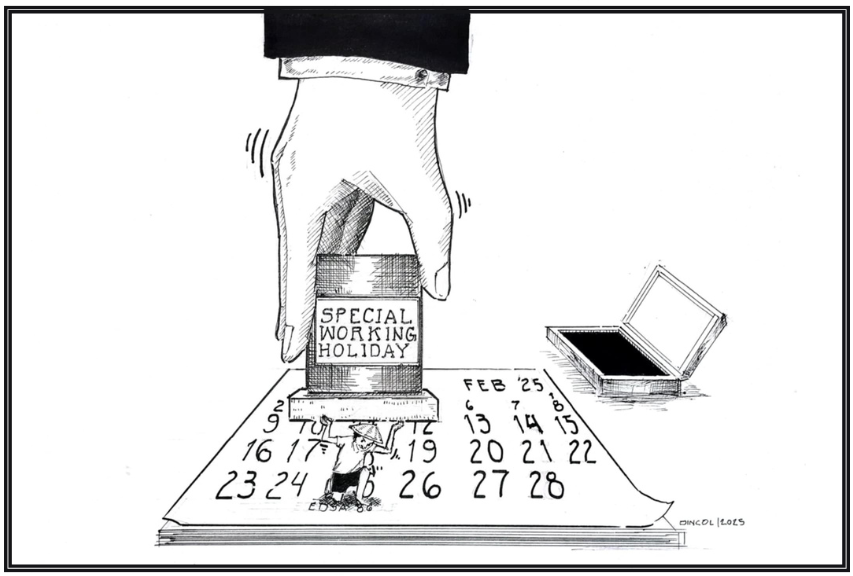
The commemoration of the EDSA People Power Revolution, touted as a ‘bloodless revolution’ for its peaceful ousting of the Marcos regime, is a glaring symbol of democracy and pivotal moment in Philippine history where the Filipinos fought back against tyranny. The dictator’s son, Ferdinand ‘Bongbong’ Marcos Jr., was elected to national office after years of the family’s persistence to again return to control. As an act to further prevent their family history’s tarnishing, the people power revolution anniversary was declared as a Special (Working) Day though Presidential Proclamation No. 727; an act that is blatant lowering the significance of the date. This is not just a matter of governance, but rather an alarming attempt to rewrite history – to blur the memory of the past, and to paint the dark Marcos dictator in a better light.
The 3-day peaceful, nonviolent uprising was a pivotal moment in Philippine history – leading to the ousting of Ferdinand Marcos Sr.’s 21-year authoritarian rule and the restoration of democracy in the country. The movement was driven by the public’s widespread outrage on electoral fraud, human rights violations, economic mismanagements, and the nail to the coffin – the assassination of Benigno ‘Ninoy’ Aquino Jr. in 1983. This prompted the defection of many of Marcos Sr.’s key allies which loosened his grip on power. Having fled to Hawaii, the opposition senator’s wife Cory Aquino was then elected to presidency.
This is not the first time the Marcoses have tried to whitewash the Marcos dictatorship and to discredit the People Power Revolution. A well-funded disinformation campaign sought to attribute fake economic developments and exaggerated infrastructure projects to Marcos Sr., touting him as ‘the greatest leader in Philippine history.’ The existence of a debunked ‘Tallano Gold’ was also used to justify the Marcos’ immense wealth. They event go as far as to label the revolution as a ‘failure’ and an ‘oligarchy-driven coup’ – establishing the narrative that post-EDSA administrations were more corrupt than his.
The decision to label it to a working holiday is a deliberate political move to undermine the significance of the revolution. It reduces public engagement and remembrance, which effectively diminishes its importance. For decades, February 25 is a time for reflection, discussion, and commemoration. Making it a working holiday deprives many Filipinos of the opportunity to participate in activities and discussions that keep the lessons alive.
Younger generations, who did not experience Martial Law, may grow with little to no understanding of the significance of what EDSA represented – Filipinos uniting to overthrow a corrupt and oppressive regime may fade into obscure memory, making it easier for the Marcos family’s revisionism to take hold. There will be less institutional emphases on EDSA, and no official commemorations pave the way for revisionism and misinformation to spread, particularly on social media where the family’s mechanism runs hard to work.
National holidays are symbolic markers of collective identities. Making it a working holiday sends the message that it is no longer relevant or worth remembering – undermining the sacrifice of those who fought for democracy. Downgrading EDSA is part of a more larger and dangerous trend of historical revisionism that has been reshaping the public’s perception of the Marcos family regime and the EDSA revolution – it does simply mean reinterpreting history, it is deliberately altering the facts to serve their political agenda.
The EDSA People Power Revolution is a defining moment in Philippine history which showcased the collective action of the Filipino people to reclaim democracy – triumphing over dictatorship, corruption, and oppression. We must not let the people forget the hard-earned freedoms it restored to society. It is our responsibility to make the memory alive and to ensure that its lessons continue to guide the future of the Philippines. It is also understanding the dangers of authoritarianism and the importance of democratic values. If we allow ourselves to forget, we will fall into the same cycle of deception, disinformation, and distortion, it will enable tyranny to rise again.
EDSA was not just the end of the fight for democracy – it also reminded us that democracy must be constantly defended. The responsibility of remembering EDSA does not solely rest on those who lived through – it belongs to every generation that comes after. We must not allow their sacrifices to become in vain – we must resist disinformation, oppose historical revisionism, and demand accountability from those in power. Its spirit is not just in the past, it’s a long-standing force that should continue us to fight against oppression, uphold the truth, and protect our freedom.
To forget EDSA is to repeat history itself.
